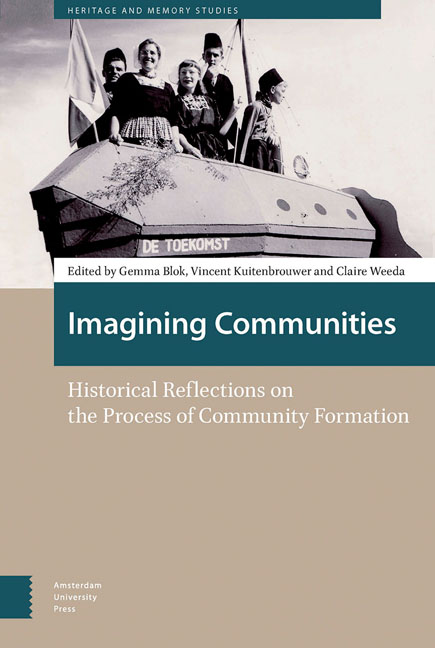Book contents
- Frontmatter
- Contents
- List of Figures
- Introduction
- 1 Meanwhile in Messianic Time: Imagining the Medieval Nation in Time and Space and English Drinking Rituals
- 2 Diverse Origins and Shared Circumstances: European Settler Identity Formation in the Seventeenth-Century Plantation Colony of Suriname
- 3 Imagining Europe: The Peace of Ryswick (1697) and the Rise of European Consciousness
- 4 Gypsy Music and the Fashioning of the National Community
- 5 ‘Tired, Worried and Overworked’: An International Imagined Community of Nervous Sufferers in Medical Advertisements, 1900-1920
- 6 ‘From Heart to Heart’: Colonial Radio and the Dutch Imagined Community in the 1920s
- 7 Indonesian Nationalism in the Netherlands, 1920s-1930s: Long-Distance Internationalism of Elite Pilgrims in Homogeneous, Empty Time
- 8 Time, Rhythm and Ritual: Imagined Communities in L’espoir (1937) and Les sept couleurs (1939)
- 9 Stamverwantschap and the Imagination of a White, Transnational Community: The 1952 Celebrations of the Jan van Riebeeck Tercentenary in the Netherlands and South Africa
- 10 ‘L’Oranie Cycliste, une grande famille’: Recycling Identities and the Pieds-Noirs Communitas, 1976-2016
- 11 Remembering and Imagining the National Past: Public Service Television Drama and the Construction of a Flemish Nation, 1953-1989
- Index
8 - Time, Rhythm and Ritual: Imagined Communities in L’espoir (1937) and Les sept couleurs (1939)
Published online by Cambridge University Press: 11 December 2020
- Frontmatter
- Contents
- List of Figures
- Introduction
- 1 Meanwhile in Messianic Time: Imagining the Medieval Nation in Time and Space and English Drinking Rituals
- 2 Diverse Origins and Shared Circumstances: European Settler Identity Formation in the Seventeenth-Century Plantation Colony of Suriname
- 3 Imagining Europe: The Peace of Ryswick (1697) and the Rise of European Consciousness
- 4 Gypsy Music and the Fashioning of the National Community
- 5 ‘Tired, Worried and Overworked’: An International Imagined Community of Nervous Sufferers in Medical Advertisements, 1900-1920
- 6 ‘From Heart to Heart’: Colonial Radio and the Dutch Imagined Community in the 1920s
- 7 Indonesian Nationalism in the Netherlands, 1920s-1930s: Long-Distance Internationalism of Elite Pilgrims in Homogeneous, Empty Time
- 8 Time, Rhythm and Ritual: Imagined Communities in L’espoir (1937) and Les sept couleurs (1939)
- 9 Stamverwantschap and the Imagination of a White, Transnational Community: The 1952 Celebrations of the Jan van Riebeeck Tercentenary in the Netherlands and South Africa
- 10 ‘L’Oranie Cycliste, une grande famille’: Recycling Identities and the Pieds-Noirs Communitas, 1976-2016
- 11 Remembering and Imagining the National Past: Public Service Television Drama and the Construction of a Flemish Nation, 1953-1989
- Index
Summary
Abstract
This chapter explores the temporal aspects of communities shaped in and through literature. The comparative reading of Malraux’ novel L’espoir (1937) and Brasillach's Les sept couleurs (1939) lays bare a similar recourse to rhythmic communities that rival and overcome the ‘terror’ of time in the modern age. Even though Malraux represents an international group of Republican fighters in the Spanish Civil War, whereas Brasillach depicts a collective unity of fascists, they both articulate a similar longing for a communal time experience, close to the bodily pulses and the grand eternal rhythms of nature, attuning to a sacred sense of time. They also employ comparable literary devices to bring out feelings of unity in mythic scenes, in which the individual engages in the synchronized rhythmic movements of collective singing and marching related to ritualized performances.
Keywords: literature, time, rhythm, interwar France, communism, fascism
André Malraux (1901-1976) and Robert Brasillach (1909-1945) were engaged French novelists who held radically different positions on the ideological spectrum of the 1930s and 1940s. While Malraux sympathized with communism and joined the French Resistance in the Second World War, Brasillach promoted fascism and collaborated with the German occupier. Despite their obviously different backgrounds, both writers presented types of imagined communities in their novels, two of which will be under scrutiny here: respectively L’espoir (1937) and Les sept couleurs (1939). The novels are sufficiently different from each other to illustrate communities of diverse sorts, Les sept couleurs showcasing images of the nation in fascist Italy, Nazi Germany and Franco's Spain, L’espoir picturing a group of international activists defending the Republican cause in the Spanish Civil War. Yet they are similar enough to be compared and to lay bare the ways in which communities are conceptualized in and through literature.
Both literary works can be considered romans à these which portray contemporary events through an ideological lens, anti-fascist or fascist. Interestingly, in both L’espoir and Les sept couleurs, time takes on a crucial meaning and function in the shaping of communities. Beneath the surface of political ideology, at a deeper level, time is a leitmotif connected to a wide range of themes that touch, directly or indirectly, on temporal aspects of imagined communities: the acceleration of history, the idea of decadence and the process of aging and death.
- Type
- Chapter
- Information
- Imagining CommunitiesHistorical Reflections on the Process of Community Formation, pp. 149 - 172Publisher: Amsterdam University PressPrint publication year: 2018



